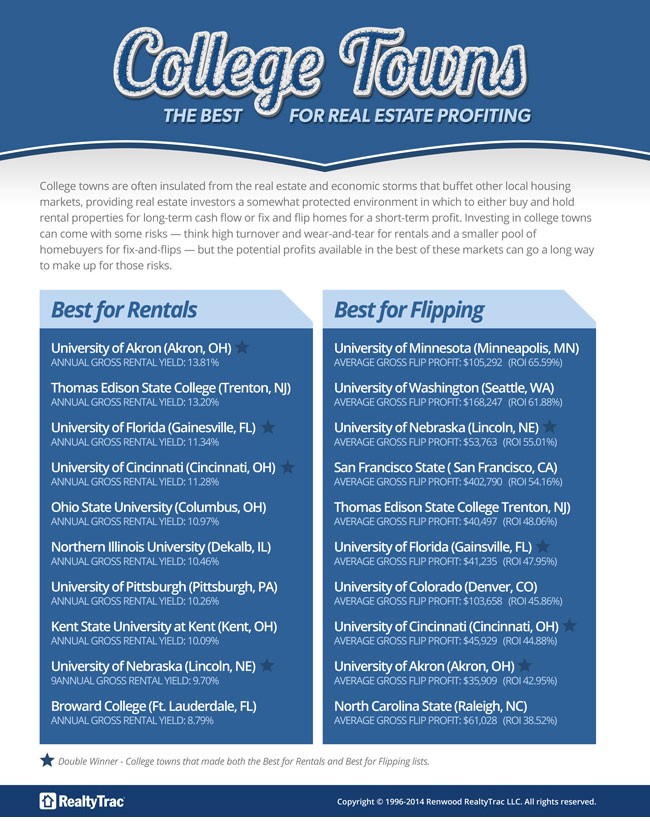Investment Real Estate Buying Real Estate in College Towns
Post on: 3 Июль, 2015 No Comment

Detroit is bankrupt — but 45 miles away the university town of Ann Arbor is booming.
Today, the job base in Detroit has been decimated; the city with more than 1 million people in 1990 now has a population of just 700,000. It is estimated that 70,000 properties have been abandoned.
Meanwhile, in Ann Arbor, the town is flourishing.
Ann Arbor is home to the University of Michigan, an educational colossus thats regarded as one of the 25 best universities in the world. If you want to see a slice of prosperity, drive from the Universitys massive and modern medical center to Zingermans, the Midwest version of a classic New York deli. The streets are filled with students and shoppers. Or, take a look at the law school: Earlier this year it received $110 million from Charles T. Munger, an associate of Warren Buffett since the 1970s and a UM alum.
In a cynical world, it seems amazing that UM has an alumni association with more than 540,000 members, or that it fills the countrys largest college football stadium, a facility that seats almost 110,000 people. But these things happen and they raise a question: Does it make sense to invest in real estate near state colleges and universities?
College Real Estate
Theres little doubt that traditional colleges face new competition from online educators and overseas campuses. Sagging state budgets impact public institutions. That said, big colleges such as UM are more than classrooms and dorms. Theyre hubs where smart and entrepreneurial people come together to build new businesses.
The result is job growth, the necessary centerpiece for any sustainable community: Between 2006 and 2012 Ann Arbor added 11,500 new jobs. This is for a city with 115,000 people.
College towns with big educational facilities are a natural magnet for jobs and investments. That also means they have a continual need for rental real estate, places to house students, faculty, and a growing job base. No less important, big institutions such as colleges, corporations and hospital centers often have housing offices which make it possible to readily find tenants.
One idea has been for the parents of college-bound students to buy property, rent it out, use the income to off-set college bills and sell after graduation. Another approach is to keep the property with the student as the manager. For more information its important to speak with local real estate brokers and to ask about such things as market conditions, rules regarding boarders, rent control and zoning.
Boarders & Roommates
New mortgage rules from the federal government are likely to make investments in college real estate more attractive. According to the Consumer Financial Protection Bureau, lenders may now consider income from both boarders and roommates in a prime residence when qualifying borrowers. Speak with mortgage lenders for details.
With 30-year fixed mortgages now in the 4 percent range and home values are still below the 2007 peak, rental real estate has a number of attractions in terms of income and depreciation, especially in communities with a strong housing demand. Moreover, there is a belief among some investors that real estate today remains undervalued.
The Business Insider reports that at a July conference in New York, billionaire investor John Paulson said the housing recovery may take another four to seven years, meaning that prices in his view are likely to rise. As well, another billionaire investor, Warren Buffett, famously told CNBC last year that he would buy a couple of hundred thousand homes if he could.
There is, of course, another possibility with back-to-school real estate: College towns make great places to retire, theres always something to do. Maybe after renting a property, it could eventually be a place to call home.
Get loan offers customized for you today.














